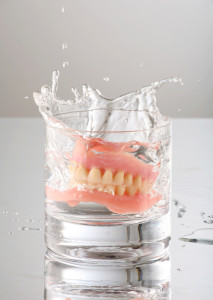 For people who have lost some or all of their teeth to decay, gum disease, or injury, false teeth mean all the difference in the world. False teeth, or dental prosthetics as they’re known clinically, serve the same purpose as other types of prosthetics, like an artificial limb: they replace the function and appearance of a missing body part. Making the right decision for replacing your missing teeth depends on knowing more about your options, which include bridges, dentures, and dental implants.
For people who have lost some or all of their teeth to decay, gum disease, or injury, false teeth mean all the difference in the world. False teeth, or dental prosthetics as they’re known clinically, serve the same purpose as other types of prosthetics, like an artificial limb: they replace the function and appearance of a missing body part. Making the right decision for replacing your missing teeth depends on knowing more about your options, which include bridges, dentures, and dental implants.
Three Common Dental Prosthetics:
Bridges
Depending on the type of bridge your dentist recommends, your prosthetic might include a biocompatible metal frame with artificial teeth attached or it could be constructed from all porcelain or zirconia. Dental bridges provide a great solution for replacing a single missing tooth or two missing teeth in a row.
Full or Partial Dentures
Advances in dental materials and technology have produced modern dentures that are lighter, better fitting, and much more realistic than the dentures of years past. Full dentures provide an excellent and affordable solution if you have no remaining natural teeth on either your top or bottom dental arch. Partial dentures, on the other hand, fill in gaps between your remaining teeth and come in removable and fixed varieties.
Dental Implants
A dental implant actually refers to a prosthetic tooth root that’s surgically inserted into the jaw and then topped with a crown, bridge, or denture. Implants replace the total structure of a natural tooth, both the crown above the gum line and the root beneath the gums, making them the most true-to-life dental prosthetic available.
Problems Associated with Missing Teeth
Research published in the Journal of Dental Research showed that the quality of a person’s diet dramatically diminishes as they lose teeth. Since edentulous people cannot adequately chew fiber-rich, plant-based foods, their overall nutrient intake diminishes, and the likelihood of developing serious systemic illnesses like diabetes and heart disease increases. People without teeth experience a 17% increase in the amount of medications they have to take daily and, according to the International Dental Journal, edentulous people experience an overall decrease in physical, psychological, and social health.







